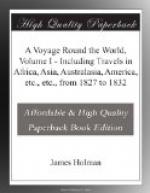The tide was running strong, taking the various directions of the coasts and rivers, and very perplexing to strangers. Unfortunately, there was no one on board who had ever been here before, and not having been able to procure a pilot, we were compelled to grope our way, both by night and by day, with only a rough sketch of a chart to guide us.
Tuesday, 22.—At daylight we got under weigh, and endeavoured to regain the channel of the Old Calabar river, but we found the tide stronger than the wind, and that it had carried us on a mud-flat off little Quay river, which, at about half ebb left the schooner aground, this obliged us to get some spars out, to prop her up on each side. At which time we were in the following situation: West point of Old Calabar river, W. by S. Fish Town point N. by W. 1/2 W. and the entrance of little Quay river N.N.E. At 5 in the afternoon we got the spars in and laid a small anchor out, with the assistance of a boat, by which, and other aid, we hoped to get the vessel entirely clear of the bank: but we only partly succeeded that tide, for on the return of low water, we were obliged to have recourse to the same means of propping her up, from there not being two feet water left on the bank.
---------- [31] The calabashes are taken down, and replaced by others, every morning and evening.
[32] We have met with some hooks made from the part of the solid wood of a prickly tree, or shrub, whence the thorn grows, and which process formed the pointed part of the hook.
[33] Wood is seldom found to be desirable for building in a hot country, from the numerous ants and other insects that assail it, particularly where the changes are so frequent from very dry to very moist weather, if we had had time, it would have been much better to have erected our buildings with brick or stone. There is, indeed, plenty of fine clay for the former; but building stones are scarce in that neighbourhood, and we had not sufficient lime,—as we had to procure burnt lime from Sierra Leone, or shells from Accra, both of which we obtained for the building of an armourer’s shop and a bakehouse. Indeed, we were obliged to use the utmost exertion to get any thing erected to shelter the Europeans and African soldiers, before the rainy season set in. As for the African mechanics and labourers, they built their own huts, in certain lines, that we called streets.




